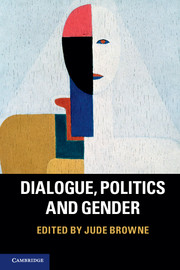Book contents
- Frontmatter
- Contents
- List of contributors
- Acknowledgements
- Introduction
- 1 Women and the standpoint of concrete others
- 2 Gender, discourse and non-essentialism
- 3 Universalism in feminist international ethics
- 4 Language, gender, dialogue, ethics
- 5 Between consensus and deconstruction
- 6 Trapped in a family portrait?
- 7 Gender, gesture and garments
- 8 What kind of dialogue do we need?
- 9 Deliberation, domination and decision-making
- Index
- References
7 - Gender, gesture and garments
Encountering embodied interlocutors
Published online by Cambridge University Press: 05 August 2013
- Frontmatter
- Contents
- List of contributors
- Acknowledgements
- Introduction
- 1 Women and the standpoint of concrete others
- 2 Gender, discourse and non-essentialism
- 3 Universalism in feminist international ethics
- 4 Language, gender, dialogue, ethics
- 5 Between consensus and deconstruction
- 6 Trapped in a family portrait?
- 7 Gender, gesture and garments
- 8 What kind of dialogue do we need?
- 9 Deliberation, domination and decision-making
- Index
- References
Summary
The ideas of deliberative democracy and discourse ethics derived from Habermas have held considerable attraction for feminists in their search for an egalitarian and inclusive model of politics. Acknowledging the model’s congeniality for a politics of difference, they have also recognised its relevance for those circumstances where difference is associated with women as citizens or with gender as a component of identity. Feminist enthusiasm has nonetheless been tempered by some well-rehearsed misgivings. Among them is a pervasive concern that despite the attractiveness of discourse ethics as a way of negotiating difference, the material and symbolic conditions that govern gender might still exclude women from accessing public life equally, as well as marginalising their voices once they do enter the public domain.
In this chapter, I consider some of the more elusive aspects of power that structure discursive situations. My understanding of power here is a broadly genealogical one, although it also draws on a phenomenological focus on everyday life. It is relevant to Habermas’s deliberative model, I suggest, precisely where the latter is most appealing, namely where diverse constituencies actually meet to negotiate fair procedures and to participate in reasoned discussion under conditions of free and equal access. For once they do so, they plunge into a complex web of intersubjective relationships where power and communication are ineluctably interwoven. What I want especially to emphasise here is that interlocutors encounter one another in the flesh.
- Type
- Chapter
- Information
- Dialogue, Politics and Gender , pp. 173 - 197Publisher: Cambridge University PressPrint publication year: 2013
References
- 3
- Cited by



